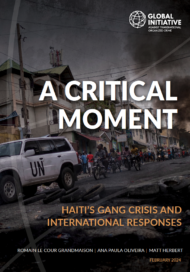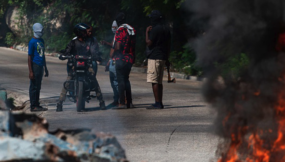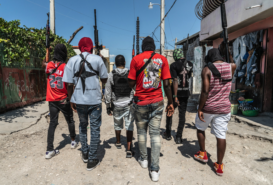Posted on 08 Sep 2025
In March 2025, the Haitian government hired Vectus Global, a private military company (PMC) led by Erik Prince, the founder of US-based PMC Blackwater, to support the public forces in combating criminal groups that control 90% of the capital, Port-au-Prince, and exert governance over vast swathes of the country’s territory and economy. Haiti joins a growing list of governments and private consortiums that have recruited Prince’s companies or are in talks with them.
With the United States withdrawing from large sectors of international cooperation, development and peacekeeping instruments, particularly within the UN, the use of PMCs appears to be filling part of the resulting void in Latin America, the Caribbean and Africa. This is particularly visible in the struggle against Haitian criminal groups, commonly referred to as ‘gangs’, which increasingly operate as criminal armed militias, possessing both firepower and manpower that surpass those of the national security forces.
Beyond the sovereignty issues raised by outsourcing public security to private actors, the surge in the use of PMCs to intervene in contexts of organized crime and illicit economies raises questions about the risk of criminalizing private actors, and of fuelling, rather than containing, extractive, collusive and corrupt practices. In 1998, former secretary-general of the UN Kofi Annan said that the world was not yet ready to privatize peace. Is that still the case?
From privateers to PMCs
The practice of hiring contractors to fight one’s battles is as old as war itself. Throughout history, leaders have enlisted mercenaries to bolster their armies and privateers to plunder their enemies. Examples range from ancient Greek and Roman armies to more recent ones, such as the mercenaries hired by the Sierra Leonean government in 1995 to combat rebels from the Revolutionary United Front. In the 1990s and early 2000s, PMCs – particularly those based in the US, the UK and South Africa – have made fortunes by providing services to governments and regional and international organizations.
According to international norms, it should be regional or international organizations that intervene in conflict and crime zones. However, geopolitical wrangling and a lack of mandates and political will are making it harder to mobilize such organizations in hotspots where they are needed. This can be seen in the recent scaling down of UN missions in the Democratic Republic of Congo, Mali and, soon, Lebanon. Furthermore, some consider PMCs to be more successful and cost-effective than peacekeepers.
However, PMCs struggle to dispel their reputation for being trigger-happy and unaccountable. A series of incidents in Iraq between 2004 and 2007, for example, contributed to Blackwater’s departure from the country and subsequent rebranding. In recent years, Russia has expanded its political and economic engagement in Africa, notably through the activities of the Wagner Group, a PMC, fuelling grievances among communities and conflict actors in targeted areas.
Outsourcing sovereignty?
In Haiti, Prince is reported to have initiated two parallel arrangements with the government. The first involves a one-year contract for his staff to act as instructors and monitors, coordinating drone strikes against gang-controlled areas and criminal leaders, serving directly in combat operations, and deploying helicopters and vessels. The second arrangement, which has not been confirmed by the Haitian government, is said to be a 10-year agreement focused on restructuring and modernizing customs and immigration services, including infrastructure development.
According to press reports, Prince’s company would receive a performance-based commission, with payments equivalent to 20% of customs revenue increases in the first three years and 15% thereafter. This would be in addition to a fixed fee of 3% on import volumes, irrespective of performance. While details remain unclear, the arrangement suggests a transfer of critical sovereign functions – security and revenue collection – into long-term private outsourcing.
In this context, the opacity of contractual arrangements should not be viewed merely as a negative externality, but as an intrinsic feature that enhances their perceived value. Under the guises of efficiency, expediency and confidentiality, PMCs – and the governments that engage them – effectively obscure responsibilities and accountability, and blur established chains of command.
Meanwhile, Haiti’s police forces and the Kenyan-led Multinational Security Support Mission in Haiti (MSS) sorely lack capacity and continue to plead for political, financial and material support. Little has been forthcoming. Although the US and Panama (in the UN Security Council) and the Organization of American States (through a roadmap) have made crucial proposals for the transformation of public security in Haiti, discussions regarding their concrete implementation have not yet been concluded. Meanwhile, the role of PMCs on the ground is becoming increasingly important.
Moreover, despite the presence of the PMCs, the situation in Haiti continues to deteriorate, with gangs dictating the pace of events. Gangs have not lost any significant territory in the capital since the arrival of PMCs in March, and have dramatically expanded their influence in the provinces.
Peace at a price
What do these kinds of operations mean for combating organized crime and the political economy that supports it, particularly with regard to illicit arms trafficking, the majority of which originates in the US? Might the deployment of PMCs escalate violence rather than reduce it? Private armies can exert force, but can they deliver justice? If Prince’s troops were to capture Haiti’s most serious offenders, what would they do with them? Is private prosecution the next step? Will this usher in an era of illiberal peace operations based on military coercion provided by whoever makes the most attractive offer? And should this trend be accepted as a palliative alternative to intractable, crime-fuelled violence?
One of the biggest issues with deploying PMCs is accountability. The oversight mechanisms controlling Vectus Global are shrouded in secrecy. Who do they report to? How will they collaborate with the Haitian police? What measures are in place to ensure accountability for potential human rights violations?
At present, there are more questions than answers. Although there are international guidelines to regulate the use of private security companies, such as the Montreux Document and the International Code of Conduct for Private Security Service Providers, the former is non-binding and the latter has no enforcement mechanism. Furthermore, contractors are not subject to military law, and there are grey areas about their rights and accountability under international and national laws.
In light of the growing number of conflicts worldwide and the waning international support for peace operations, there is an urgent need for a stronger regulatory framework concerning the use of PMCs. In Haiti’s case, the government should implement rigorous oversight and monitoring to ensure operational accountability, transparency in the use of force and strict adherence to international human rights standards. As the use of PMCs advances more rapidly than the international community’s capacity to respond effectively in the areas of peacekeeping, peacebuilding and conflict stabilization, it is imperative that the current debate is translated into a concrete policy framework.



